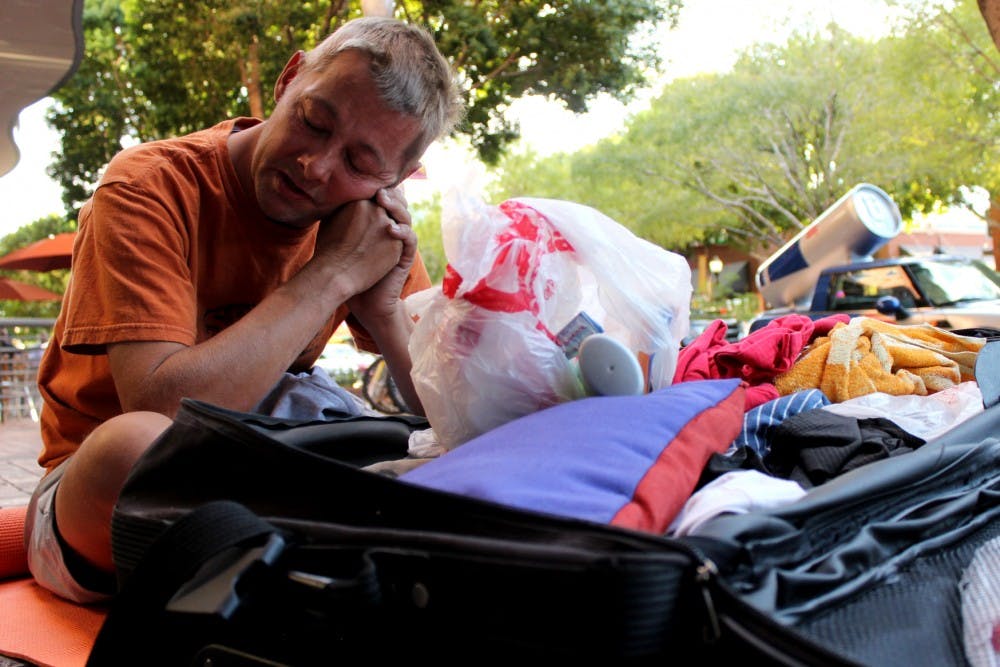A man huddles on the corner of Rural Road and Apache Boulevard, his hair unkempt, his clothing dirty. A student walks by and the man says, “Can I have some change?” or “Can I have a cigarette?” or “You have a pretty smile.” These types of interactions happen every single day across Arizona State’s Tempe campus.
What is a homeless person, beyond the fact that they do not have a home? Every person alive on this planet has a story. For the most part, the homeless aren’t trying to harm the random passerby. It is an important consideration, and our duty as members of this community to form an ethical relationship with the homeless. That starts by seeing them as equal human beings.
It is true that many students experience unpleasant interactions with the people on these street corners. Cat-calling and pestering for money are a few of the behaviors that make the homeless potentially dangerous. Even though many homeless people do not behave this way, students should probably not engage with every person that tries to communicate or approach them on the street.
It is important to recognize that the homeless do not live the sheltered life that we do. A life of scarcity can have harsh effects on the human mind. Studies have shown that being homeless is like living in a constant state of exhaustion. They also show that tight finances and meager living leads to a reduced mental capacity. This in turn can lead to short-term decision-making over long-term thinking.
This reduced mental capacity fulfills many of the negative stereotypes that the homeless hold in the mind of students. Many refuse to give them money because they believe that money will go to cigarettes or alcohol. This can be true in some cases because of the priority of short-term fulfillment for victims of scarcity.
However, this does not mean that the homeless are a menace to society. A homeless man named Buddy often asks for money on College Avenue. Buddy wears a dirty Chicago Blackhawks jersey, sunglasses and crumpled jeans, and makes it clear that he is asking for money to get a bus pass so that he can continue to search for a job. He asks for dimes, nickels and quarters.
Not all the homeless are like Buddy but, by the same token, not all the homeless are trying to collect money for their next pack of cigarettes. For those caught in the middle, students can make a difference in their lives.
There are many meaningful organizations that one can operate through to safely assist in caring for the homeless. The Phoenix Rescue Mission operates on the basis of transforming lives and transforming our city. Rather than simply feeding or clothing the homeless, the organization operates by trying to provide new beginnings for victims of poverty. Students can assist in their work either through donating online at their website or by volunteering to work in their offices.
Volunteering at a shelter or giving a person food will not completely solve homelessness.

Artwork by Australian artist Meek
As election season approaches it is important to engage as citizens. Students hold the power to elect candidates that see homelessness as an issue, and want to do something about it. Lobbying for the homeless takes place through voting. It takes place through going to town hall meetings and speaking up for a population that can not speak for itself. Finally it takes place by not letting your peers be idle bystanders.
There are 6,000 homeless people on the streets of Phoenix every night according to the Phoenix Rescue Mission. One of those people is a man named Tim, who frequents the space next to 7/11 on Lemon Street. Tim wears a suit and carries a book with him everywhere that he goes. Tim once told me that, “I once had everything, but now I have nothing even after going to ASU 10 years ago.” This can happen to anyone, to protect our futures we need to give at least a thought to Tim.
Reach the columnist at ctvinson@asu.edu orfollow @CalebLikeVauban on Twitter.
Editor’s note: The opinions presented in this column are the author’s and do not imply any endorsement from The State Press or its editors.
Want to join the conversation? Send an email to opiniondesk.statepress@gmail.com. Keep letters under 300 words and be sure to include your university affiliation. Anonymity will not be granted.
Like The State Press on Facebook and follow @statepress on Twitter.




